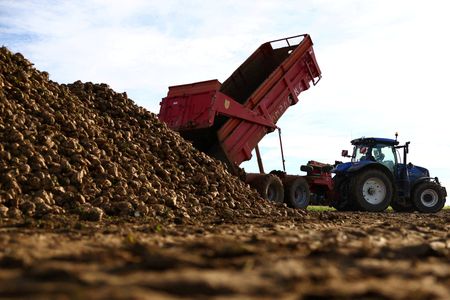By Kate Abnett and May Angel
BRUSSELS/LONDON (Reuters) -European Union member states are seeking to postpone the implementation of the bloc’s anti-deforestation law by another year, an EU negotiating draft dated November 10 shows.
The draft document, which was seen by Reuters on Tuesday, now suggests deferring the law’s application to December 30, 2026 for larger firms, and June 30, 2027 for smaller ones.
The European Commission last month proposed adjustments to ease compliance for smallholders and businesses, but stopped short of delaying the landmark policy. For many member states, “the Commission’s proposal alone was not enough,” the draft said.
CRITICS WARN OF ENVIRONMENTAL SETBACKS The ban on imports of cocoa, palm oil and other commodities linked to forest destruction is a key plank of the EU’s green agenda. This faces pushback from some industries and countries that say the measures are costly and logistically challenging. Initially set to take effect from end-2024, the policy has already been delayed by a year but tensions persist, including complaints from trading partners such as Brazil and the U.S.
EU countries such as Poland and Austria have said European producers cannot comply with traceability rules. Antonie Fountain, head of the VOICE Network which advocates for cocoa sector reform, said the delay makes it difficult to do business in the bloc and was a blow to the EU’s credibility. “During the week of COP in Brazil, it couldn’t be more ironic,” he added. Some food majors such as Nestle, Ferrero and Olam Agri back the law. They warned last month that delaying it endangers forests worldwide and is contrary to the EU’s aim of simplifying business rules. Fern campaigner Nicole Polsterer said the delay would stall the significant progress towards traceability made to date in some countries. FINAL NEGOTIATIONS UNDERWAY Under the law, exporters of commodities such as beef, coffee, soy and rubber would need to provide due diligence statements proving their products did not contribute to forest destruction. EU nations and the European Parliament are racing to seal a deal on final changes by mid-December to avoid the law kicking in as currently planned. Denmark, which holds the EU’s rotating presidency, authored the negotiating document. A spokesperson for the Danes said the aim was to secure swift backing from member states so they could negotiate a final deal in time.
“Most Member States don’t want (the law) in its present form to enter into force by the end of the year,” they said.
(Reporting by Kate Abnett and May Angel; Editing by Alison Williams, Alex Richardson and Alexander Smith)










